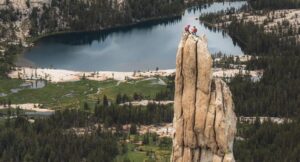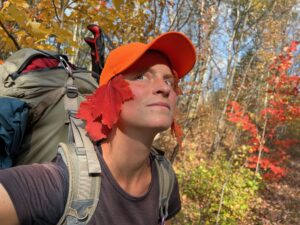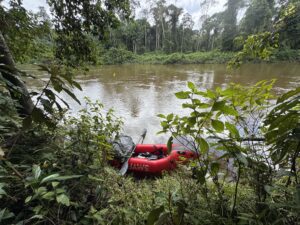Last July, 47-year-old John Martin left Anchorage, Alaska and traveled north 500km by road, towing an eight-foot sailing dinghy past Denali National Park and into the interior. He was headed for Nenana: This small village had been the starting point of the 1925 Great Race of Mercy, in which a team of 20 mushers and their dogs relayed an antitoxin 1,085km west to Nome in five-and-a-half days, after a diphtheria epidemic swept through the remote coastal settlement, threatening 10,000 lives.
Martin, too, was on his own mission. Carrying little other than a compass, a jug of water and grape juice, and a theological book — The Crown of Truth by Walt Arden — he set his dinghy down in the Tanana River, aiming for the distant shores of China some 5,500km away.
Much like the mushers of yesteryear and the Imperial Russian merchants who sought furs in the region, Martin’s journey was based on practicality: He was trying to reach his Chinese wife and son in Guangdong province. In 2007, while he was in China with them, the US Government revoked Martin’s passport after he fell behind on child support payments for his three daughters from a previous marriage. Forced to return to the U.S. without his current family and unable to resolve the passport issue, he had to consider more innovative means to reach them.
Originally from Soldotna, Alaska, Martin’s parents were raised on the Kenai Peninsula on their family homesteads. Along with his brother and sister, he spent his early years here. “We had some horses, a mix of various farm animals and an annual garden,” he recalled. “Our home was on the edge of vast undeveloped lands, which I often explored. My mom had taught me about many edible wild plants and berries. I was very much at home in nature and enjoyed basic things. These experiences at such a young age instilled within me a love of nature and a fondness for a simple life.”
Over the next four weeks, Martin sailed 1,200km down the Tanana and Yukon Rivers before reaching Emmonak, a town of 750 people, overlooking the Bering Strait. Martin spent 12 days resting up and making modifications to his Walker Bay dinghy which was outfitted with a small sail, a daggerboard, a rudder and inflatable sponsons for stability. With a 450km crossing of the Bering Strait now ahead of him, his main priority was food. He built a wooden, stern-mounted drying rack and loaded it up with salmon bellies that were given to him by the local fish processing plant. Everything else, including his anchor and cookware, were left behind to lighten his load.

Martin sailing across the Yukon River toward Emmonak, nearly one month after leaving Anchorage, Alaska. Photo: Jerry Lamont
This wasn’t the first time that Martin had attempted this audacious trip. In 2011, he planned to walk to China by crossing the partially frozen Bering Sea — no easy feat, because of the need to hopscotch over fast-moving pack ice. Aside from the Siberian Yupik people who were the first to cross the Bering land bridge at the end of the last Ice Age, less than half a dozen teams have made it across on foot. German Max Gottschalk was the first documented person to cross the strait, by dogsled rather than by boat, in March 1913, from Siberia to Shishmaref, Alaska.
However, Martin didn’t reach the Bering Strait. Faced with significant obstacles in Alaska, including having to swim across several icy rivers, he called it quits after 15 days.
On his second attempt in the winter of 2014, he also didn’t make it out of Alaska: An unusually warm winter left too little ice and much open water on the rivers.

Ice conditions on the Bering Sea: A joint research team from Chukotka and the U.S. Geological Survey ventures out near St. Lawrence Island, to study the local walrus population. Photo: USGS
Even with the odds against him, Martin was not easily discouraged, and in the summer of 2018, he pushed off from the shores of mainland North America with only a blanket and the clothes on his body to protect him from the tempestuous conditions of the North Pacific. For over a week, Martin drifted uneventfully toward the shores of Russia. He appreciated the quiet times, he said, singing or talking to himself and dipping into Arden’s book to pass the time.
Undoubtedly, the thought of being crammed into a small dinghy (Martin is 6-foot-2) and cast out into open sea alone for an indeterminate number of days will sound like purgatory to most. However, Martin is accustomed to confinement and the unknown. In 1995, aged 23, he was charged for a sex offense and served eight years in jail. Clearly, for someone whose IQ is supposedly high enough for him to join Mensa, he has had some discordant mental lapses in his life.
But since then, he has gone on to become an advocate for the homeless, and once spent months sleeping outside of Anchorage City Hall, protesting against the Mayor’s policy of clearing homeless camps. “Being on the streets at night, you might as well be in the middle of nowhere since everything is shut down and locked up,” said Martin. “Learning how to survive in the streets of Anchorage certainly prepared me for wilderness travel and cold weather survival.”

Martin’s route from Anchorage, Alaska to Lavrentiya, Russia. Map: John Martin
On the eleventh day, in the vicinity of St. Lawrence Island, the winds died down and Martin was forced north by currents. Dehydrated and with no available rainwater to collect, he began drifting into Russian waters. He sighted Big and Little Diomede, two islands divided between Russia and the US, before washing up on the shores just south of Lavrentiya, a small coastal settlement in the sparsely populated Chukotka region of Siberia. His total passage amounted to 800km. Martin picked up a whiff of smoked salmon in the air and followed the scent to a Chukotkan family. Concerned for his well-being, they fed him, dried out his clothes and then called the Russian authorities, which flew him to Anadyr, Chukotka’s administrative capital.

The coastline of Chukotka forms the easternmost point of Eurasia. Photo: NOAA Pacific Marine Environmental Laboratory
“The authorities did not know what to do with me since I did not have proper documentation,” said Martin. “I could not exit the country without travel documents, and they could not issue documents without a deportation order. They attempted to deport me but that proved harder than they initially thought.”
So for the first three and a half months, he spent his time in a hospital under 24-hour supervision, but he was treated very well, with big smiles and even requests for selfies by local Siberians.

Martin, centre, with Gennadiy and Valera, the guards who accompanied him to Moscow. Photo: John Martin
“According to Russian law, you cannot deport law-abiding people, and … there were no charges brought,” he said. “It took four trials and six months to sort out the details and finally let me on my way.”
Undeterred as ever, Martin is now back in Alaska working on a book which he hopes will earn him enough money to pay back his alimony and regain his passport.
“Although I was unsuccessful in reaching my family in China, the experience of the journey is priceless,” said Martin. “I was driven by my love for my family, and the determination to reach them, but it is my faith in God that gives me the boldness to venture out on a journey that for many others, seems nothing less than crazy. You could say the adventure was a bonus.”

Martin with friends from Anadyr, Russia, pictured with his boat and the equipment he used to cross the Bering Sea. Photo: John Martin






